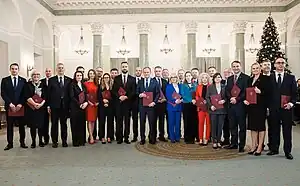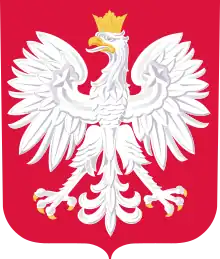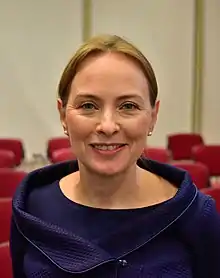Third Cabinet of Donald Tusk Trzeci rząd Donalda Tuska | |
|---|---|
22nd Cabinet of Poland | |
| 2023 – present | |
 Ministers pictured after their swearing-in, 13 December (2023) | |
| Date formed | 13 December 2023 |
| People and organisations | |
| President | Andrzej Duda |
| Prime Minister | Donald Tusk |
| Prime Minister's history | 2007–2014, 2023–present |
| Deputy Prime Ministers | Władysław Kosiniak-Kamysz Krzysztof Gawkowski |
| No. of ministers | 26[1] |
| Member parties | Civic Coalition Poland 2050 Polish Coalition New Left |
| Status in legislature |
|
| Opposition parties | Law and Justice (Main) Confederation (Minor) Left Together (Confidence and supply) |
| Opposition leader | Jarosław Kaczyński |
| History | |
| Election(s) | 2023 parliamentary election |
| Legislature term(s) | 10th Sejm & 11th Senate |
| Predecessor | Morawiecki III |
 |
|---|
The Third Cabinet of Donald Tusk is the coalition government of Poland headed by Donald Tusk who was officially nominated and confirmed as the Prime Minister of Poland on 11 December 2023 by the members of the Sejm following the failure of Mateusz Morawiecki's Third Cabinet to secure a vote of confidence.[2] On 12 December, Tusk addressed the parliament and announced members of his cabinet, later that day Tusk's cabinet successfully obtained a vote of confidence with 248 of the 460 MPs voting in the affirmative.[3][4] He and his cabinet were officially sworn in by president Andrzej Duda on 13 December 2023.[5]
Tusk previously served as Prime Minister of Poland between 2007 and 2014, President of the European Council between 2014 and 2019, and the president of the European People's Party (EPP) from 2019 to 2022.[6] The opposition's victory in the 2023 Polish parliamentary election and Tusk's return to power in Poland were mostly positively received by the international community, with multiple news outlets pointing to the erosion of certain democratic structures in Poland and the worsening of the country's relationship with the European Union under the former right-wing government led by Law and Justice.[7][8][9]
Background
2023 parliamentary election
Tusk's cabinet was formed following the dissolution Morawiecki's caretaker government originally established as the result of 2023 Polish parliamentary election, which took place on Sunday, 15 October 2023. The United Right won a plurality of seats but fell short of a Sejm majority. The opposition, including the Civic Coalition, Poland 2050, Polish People's Party, and The Left, secured a Senate majority.[2]
Although the United Right would be unable to govern on its own, the Polish president Andrzej Duda stated his intention to re-appoint the incumbent Mateusz Morawiecki as Prime Minister due to the existing albeit unofficial convention of nominating a member of the winning party.[10] The four opposition parties criticized Duda's decision as a delay tactic. The opposition parties subsequently signed a coalition agreement on 10 November, de facto taking over control of the Sejm, and agreed to nominate former Prime Minister and European Council President Donald Tusk as their candidate.[11] Morawiecki's new cabinet, dubbed "two-week government" and "zombie government" by the media due to its anticipated short-livedness, was sworn in on 27 November 2023.[10][12]
Nomination of Donald Tusk
On 11 December 2023, the Morawiecki government was defeated in the Sejm, effectively ending its tenure.[2] Immediately following the vote, the four-party opposition coalition nominated Tusk as prime minister. Left Together, although part of The Left coalition and therefore entitled to cabinet seats, opted not to enter the government due to a number of key issues being left out of the coalition agreement, but has also vowed to support Tusk's government in votes of confidence.[13] The nomination was subsequently confirmed by absolute majority vote, with 248 members of the Sejm voting in favor.[2] Also on 11 December, president Andrzej Duda accepted Morawiecki's resignation, while designating him as acting Prime Minister of a caretaker government until Tusk's swearing-in ceremony, which took place on 13 December 2023.[14][5]
Confirmation of the cabinet
On 12 December 2023 Tusk addressed the parliament and announced members of his cabinet. Following his two hour speech 254 MPs signed up to ask questions about his upcoming government.[15] Due to an antisemitic incident perpetuated by MP Grzegorz Braun in the Sejm Complex, the vote of confidence was delayed by several hours.[16] At 9:53 pm Tusk's cabinet secured the vote of confidence with 248 of the 460 MPs voting in the affirmative.[3] He and his cabinet were officially sworn in by president Andrzej Duda on 13 December 2023.[5]
Cabinet
On 12 December, members of the Cabinet presented by Donald Tusk were elected by Sejm. The ministers assumed their offices on 13 December, upon their appointment and swearing-in by the President.[17]
Notations
- ↑ Ministers in charge of government administration departments
See also
References
- ↑ "Skład Rady Ministrów - Kancelaria Prezesa Rady Ministrów - Portal Gov.pl". Kancelaria Prezesa Rady Ministrów (in Polish). Retrieved 13 December 2023.
- 1 2 3 4 Higgins, Andrew (11 December 2023). "Donald Tusk Chosen as Poland's Prime Minister After Rival Is Rejected". The New York Times. ISSN 0362-4331. Retrieved 11 December 2023.
- 1 2 "Głosowanie nr 105 na 1. posiedzeniu Sejmu" (in Polish). 12 December 2023. Retrieved 12 December 2023.
- ↑ Tilles, Daniel (8 December 2023). "Tusk names members of new Polish government likely to take office next week". Notes From Poland. Retrieved 11 December 2023.
- 1 2 3 Gera, Vanessa (11 December 2023). "Donald Tusk becomes Poland's prime minister with the mission of improving European Union ties". Associated Press. Retrieved 11 December 2023.
- ↑ de La Baume, Maïa (20 November 2019). "Donald Tusk elected president of European People's Party". POLITICO. Retrieved 11 December 2023.
- ↑ Gera, Vanessa; Scislowska, Monika (12 December 2023). "Poland's new prime minister vows to press the West to continue helping neighboring Ukraine". AP News. Retrieved 13 December 2023.
- ↑ Chiappa, Claudia (11 December 2023). "Donald Tusk wins parliament's backing to be new Polish PM". POLITICO. Retrieved 13 December 2023.
- ↑ Picheta, Rob (13 December 2023). "Analysis: Donald Tusk beat Poland's populists. Now Europe is looking at him for hope". CNN. Retrieved 13 December 2023.
- 1 2 Cienski, Jan (27 November 2023). "Poland's zombie government shuffles into being". POLITICO. Retrieved 11 December 2023.
- ↑ Easton, Adam (10 November 2023). "Poland's Tusk-led pro-EU opposition signs deal and waits to govern". BBC. Retrieved 10 November 2023.
- ↑ "Prezydent powoła "rząd dwutygodniowy"". wyborcza.pl (in Polish). Retrieved 27 November 2023.
- ↑ "Dlaczego partia Razem nie wejdzie do rządu Tuska? Adrian Zandberg tłumaczy". Rzeczpospolita (in Polish). Retrieved 13 December 2023.
- ↑ Henley, Jon; correspondent, Jon Henley Europe (11 December 2023). "Donald Tusk set to take power in Poland after PM loses confidence vote". The Guardian. ISSN 0261-3077. Retrieved 11 December 2023.
- ↑ S.A, Telewizja Polska. "Marszałek Sejmu: 254 posłów zgłosiło się do zadania pytań premierowi Tuskowi". www.tvpparlament.pl (in Polish). Retrieved 12 December 2023.
- ↑ Day, Matthew (12 December 2023). "Watch: Far-Right MP uses fire extinguisher to snuff out Hanukkah candles". The Telegraph. ISSN 0307-1235. Retrieved 12 December 2023.
- 1 2 3 4 Partyła, Magdalena (13 December 2023). "Rząd Donalda Tuska zaprzysiężony". RMF24 (in Polish). Retrieved 13 December 2023.
- ↑ "Rozporządzenie Prezesa Rady Ministrów z dnia 18 grudnia 2023 r. w sprawie szczegółowego zakresu działania Ministra do spraw Unii Europejskiej" (PDF) (in Polish).
_(cropped2).jpg.webp)

.jpg.webp)
.jpg.webp)
.jpg.webp)
.png.webp)


.jpg.webp)
.jpg.webp)


.jpg.webp)

.jpg.webp)

.jpg.webp)
.jpg.webp)
.jpg.webp)


.jpg.webp)


.jpg.webp)
.jpg.webp)
